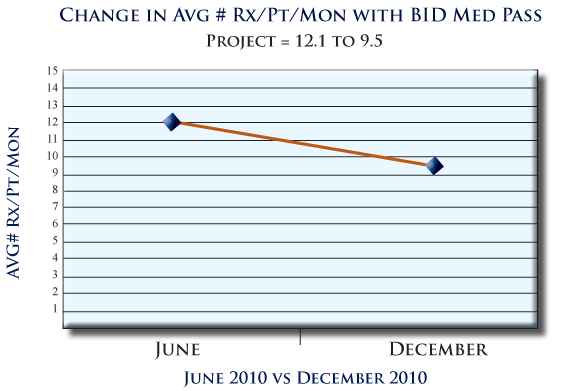An award-winning twice-daily (BID) medication pass program pioneered by The Pines, an Easton, Md.-based skilled nursing facility that is part of a Genesis HealthCare companywide medication administration initiative, has changed the lives of residents and staff alike by reevaluating the medication administration process and reducing the frequency of medications administered to residents. As a result, residents have experienced improved sleep, socialization, and overall quality of life. The program has also resulted in increased job satisfaction for caregivers.
Implementing The Program
Any medication pass system has a tremendous impact on a resident’s sleeping and waking hours, meals, and general psychological well-being. “Residents in long term care are often subjected to polypharmacy that places them at risk for adverse drug reactions, medication errors, increased costs, and decreased quality of life,” says Michael Crowley, MD, medical director of The Pines.
The process began with a thorough evaluation in 2010 of medication administration in the long term care units at The Pines. Based on the annual survey of residents in April 2010, the facility’s Quality Improvement Committee met to discuss the results, which indicated resident dissatisfaction with the sheer volume of medications as well as the amount of time they were spending waiting each day to receive their pills.

“It was not uncommon for residents to be approached up to nine times per day in a 24-hour period. It was an institutional approach, everything centered around pill times,” says Crowley.
Residents had to sit in their rooms for hours on end awaiting the arrival of the pill cart and often missed recreational activities or time spent with friends.
An interdisciplinary team was formed, which included the administrator, director of nursing, medical director, nurse practitioner, pharmacist, staff nurse, and the medication aide.
The goal for the project was to individualize each resident’s drug regime, eliminate unnecessary and nontherapeutic drugs, and establish two medication delivery times of 8:00 a.m. and 8:00 p.m. daily.
Delivery times were deliberately moved away from peak recreation and dining times. With the cooperation of the pharmaceutical team, each resident received a new schedule of medications that most effectively managed his or her care, while also streamlining their medication administration throughout the day.
In some cases, residents were prescribed longer-acting medications in order to eliminate med passes. Most residents were able to easily transition to a twice-daily administration and were overwhelmingly pleased with the resulting schedule.
Improved Quality Of Life
The resulting success of the med pass program has brought about great changes for the residents of The Pines. Enhanced dining services and more time for social activities have left residents feeling as though life no longer revolves around medication.
Alfred Wilson, a resident of The Pines for many years, has experienced a significant improvement in his daily routine. “I love that I can participate in whatever is happening that day, without having to worry about missing the medication cart. I know it will be coming at certain times, before and after most of my meals and events during the day,” he says.
Medication is no longer administered during activities for most patients, and mealtimes occur long before and after the designated times, freeing residents and nursing staff to focus on the events of the day.
On the secured dementia unit, the medication aide was transitioned to a direct care position. These additional hours enabled all staff to be responsible for the unit’s activities, and licensed nurses have more time to identify and assess residents and plan for the appropriate treatment. Finally, the medication carts have been put away to create a more residential atmosphere in each nursing unit.
Staff Satisfaction
Improved staff satisfaction and performance have been unexpected byproducts of the med pass program. Interviews with staff members reveal an increase in job satisfaction due to the increase in direct care activities.
Staff felt “chained to the medication cart” and felt the existing medication system was an inefficient use of anyone’s time.
The annual employee opinion survey reflected a significant increase in overall employee satisfaction, with the number of employees reporting excellent/good overall job satisfaction up by 12 percent from the prior year.
The culture change toward more resident-centered care has allowed staff at The Pines to do what they do best: interact with residents.
While there has been no significant change in medication costs, the hours normally spent “pushing the pill bus” have been reallocated toward direct resident care.
The med pass program has been life changing for staff and residents of The Pines.
“[It] exceeded expectations, and we were able to convert 90 percent of our long-term residents to the twice-daily medication pass. As a result, the number of prescriptions per residents dropped by 10 percent on average, the amount of time dispensing medications dropped by almost 50 percent, and resident satisfaction increased by 8 percent,” Crowley says.
This program is replicable and sustainable in other nursing centers, as no additional staff were added to achieve these outcomes nor were there additional expenditures.
Award-Winning Approach
The Pines’ innovative approach gained the recognition of AMDA—Dedicated to Long Term Care Medicine, which awarded The Pines its 2011 Evercare Award, one of only three centers in the entire country to win the award this year.
For tips on how to iniative a BID med pass program in your facility, click HERE.
Stacey Radcliffe, senior administrator of The Pines, a 185-bed Genesis HealthCare skilled nursing facility in Easton, Md., can be reached at Stacey.radcliffe@genesishcc.com. Marylee Grosso, RPh, a senior director of operations for Genesis, responsible for corporate medication therapy management initiatives, can be reached at Marylee.grosso@genesishcc.com.